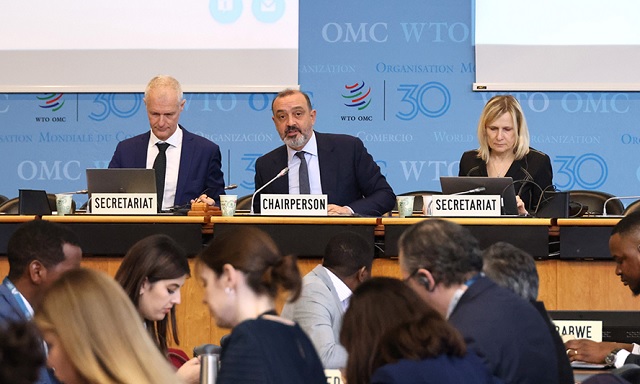OMC insta a los Miembros abrir nuevo camino para las conversaciones sobre la agricultura
Presidente de las negociaciones sobre la agricultura, dijo que los Miembros tenían que reanudar las conversaciones sustantivas el próximo año.

06 de diciembre del 2024.- En las reuniones de fin de año, el 4 de diciembre, el Presidente de las negociaciones sobre la agricultura, el Embajador Alparslan Acarsoy (Türkiye), dijo que los Miembros no debían perder tiempo en cuestiones de proceso y tenían que reanudar rápidamente las conversaciones sustantivas el próximo año. El Grupo Africano y el Grupo de Cairns de países exportadores de productos agropecuarios informaron de que habían hecho progresos en sus conversaciones bilaterales, y que su objetivo era presentar un conjunto amplio de modalidades para la reforma de la agricultura antes de la Decimocuarta Conferencia Ministerial (CM14).
Chair’s Report
The Chair summarized recent efforts to gain support for a facilitator-led process but noted that the approach had failed to achieve consensus among members.
He emphasized that, in his view, WTO members ought to bear in mind three considerations as they move forward: proponents should initiate discussions with other members on topics of their interest; members should bear in mind the need for an overall balance in the negotiations, while addressing past mandates and current and future challenges; and members should ensure inclusivity by regularly updating the committee on progress.
He encouraged members to engage substantively with one another, following the example set by the African and Cairns Groups. «2024 has been a year of discussing the process, 2025 should be a year of substance,» he told the meeting.
African Group and Cairns Group report progress on joint work
The African Group and Cairns Group reported progress in their informal discussions designed to facilitate a constructive dialogue with the aim of identifying commonalities and progressing as much as possible towards a «modalities package across all agriculture topics». The goal of the two groups is to continue this technical work and submit a document for the membership’s consideration in order to advance work ahead of MC14 in Yaoundé, Cameroon.
The two groups said that they had detailed technical discussions on domestic support for the agricultural sector, including on key elements. These included: how to cap trade-distorting support; how to address the maximum level of trade-distorting support bound in some members’ schedules to help level the playing field ; how to design and implement reductions; how to establish new flexibilities for non-exporters that wish to provide support for specific products; disciplines on the use of the “green box”, a category of support deemed to cause no more than minimal trade distortions; and how to limit the concentration of support for cotton.
The two groups are still discussing how to resolve problems some developing countries face under WTO rules when buying food at government-set prices for public stocks for food security purposes. The talks on other agriculture negotiating topics have yet to progress significantly. The groups expressed their readiness to collaborate with other WTO members to advance these discussions before MC14.
Several members of the two groups —including the host of MC14, Cameroon—reaffirmed their commitment to continuing discussions, aiming to achieve tangible outcomes on agriculture by the Ministerial Conference. Several members also emphasized the importance of the collaboration and the benefits of building confidence through members’ efforts to engage with one another in good faith.
New submission
Guyana presented a new proposal, circulated on 3 December, outlining a pathway towards advancing the agricultural negotiations ahead of MC14. The proposal places emphasis on prioritizing text-based negotiations within existing dedicated sessions in three areas: food bought at administered prices for public stocks ; the proposed new special safeguard mechanism ; and cotton. The proposal also calls on the Chair of the agriculture negotiations to draft texts on other key topics, such as market access, domestic support, and export-related matters, using members’ proposals as a basis to facilitate negotiations. The submission also proposes that cross-cutting issues, including transparency, sustainability, and food security, be addressed through a facilitator-led process.
Several members welcomed the submission by Guyana as a valuable contribution to the discussion. These members expressed their openness to engaging with Guyana and other members to develop a practical framework for advancing the process. Some members highlighted the need to build trust and expressed various views on how this could be done. Some requested clarifications on certain elements of Guyana’s proposal and said more time was needed to deliberate on it.
Some developing members stressed the need to prioritize public stockholding, the special safeguard mechanism, and cotton in light of past decisions, with reference being made to a joint communication from India, Sri Lanka, and Pakistan ,circulated on 4 November. Several other members referred to the mandate provided in Article 20 of the Agreement on Agriculture on the continuation of the reform process. They emphasized that, in their view, all agricultural negotiating topics were interconnected, and advocated that a holistic approach be taken.
Similar views were expressed in two dedicated sessions that the chair convened on public stockholding and the special safeguard mechanism, where proponents reiterated the importance of delivering outcomes on these topics by MC14, while other members highlighted the interconnectedness of these topics with other negotiating issues.
Following the call made by the Chair, several members called for a quick resumption of substantive negotiations in 2025, including through members-led initiatives such as the process initiated by the African and Cairns groups.















